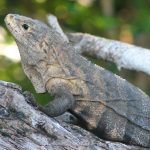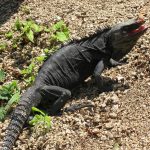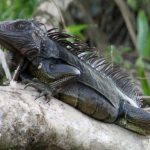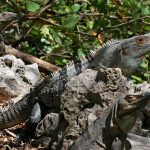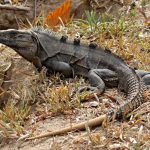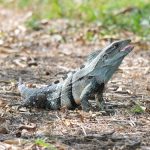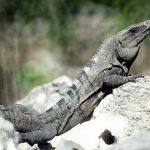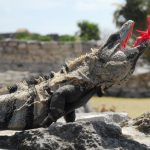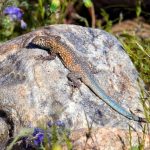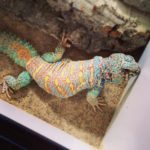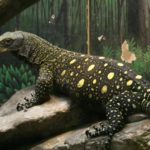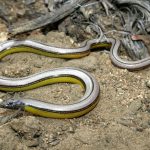Black Iguana
Black iguana is a species of lizard native to Central America and Mexico. It is the largest species in its genus and is known to be the fastest lizard in the world. The species is diurnal and an excellent climber.
| Kingdom | Animalia |
| Phylum | Chordata |
| Subphylum | Vertebrata |
| Class | Reptilia |
| Order | Squamata |
| Suborder | Lacertilia |
| Family | Iguanidae |
| Genus | Ctenosaura |
| Scientific Name | Ctenosaura similis |
| Other Names | Black spiny-tailed iguana, black iguana, black ctenosaur |
| Size | Males: Up to 1.3 m Females: 0.8–1 m |
| Weight | Around 5 kg |
| Color | Whitish gray or tan ground color with a series of 4–12 marked dark bands on the upper surface extending almost to the underside scales; males possess orange color around the head and throat during the breeding season with strands of blue and peach on the jaws |
| Distribution | Mexico and Central America (native); Florida in the United States (introduced) |
| Habitat | Open borders of the forests; dry, arid, open terrain |
| Diet | Flowers, leaves, fruit and stems, sometimes eat smaller animals, eggs, and arthropods |
| Predators | Juveniles fall prey to raccoons, snakes, hawks, egrets, owls, herons, cats, and dogs whereas adults are preyed upon by ocelots, jaguars, pumas, anacondas, boa constrictors and dogs |
| Breeding Season | Spring |
| Mode of Reproduction | Oviparous (egg laying) |
| Clutch Size | Up to 30 eggs |
| Incubation Period | 3 months |
| Reproductive Age | Around 3 to 4 years of age |
| Average Lifespan | More than 60 years |
| IUCN Conservation Status | Least Concern |
Black Iguana Pictures Gallery
- Black Ctenosaur
- Black Iguana Images
- Black Iguana
- Black Iguanas
- Black Spiny Tailed Iguana
- Ctenosaura Similis
- Iguana Black
- Black Iguana Pictures


